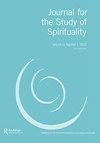Some issues in understanding spirituality as relational
IF 0.8
0 RELIGION
引用次数: 4
Abstract
ABSTRACT In the present literature, understanding and interpretation of spirituality has moved from the transcendent to the relational aspect of the human being. This movement has been necessitated by shortcomings in understanding spirituality as transcendent. The idea of transcendent is unverifiable and subjective. Moreover, it is possible in the context of specific cultural and religious traditions, but not in a multicultural context. Spirituality in its relational sense is interpreted as a process of developing an intrinsic human capacity that motivates people to search for meaning, purpose, and contribution to life in a social context. The relational aspect of spirituality can be understood as ‘thoughtful love of life’ leading to what may be termed ‘naturalized spirituality’. However, understanding the relational aspect of spirituality has its own problems. This paper indicates some limitations to understanding spirituality as relational and argues that, rather than aiding an understanding of the concept, it creates more confusion. This is because the notion of ‘relational’ (i) does not exclude the transcendent, and (ii) does not distinguish between what is spiritual and what is not.把灵性理解为关系的一些问题
摘要在当代文学中,对精神的理解和阐释已经从人的超越性转向了人的关系性。这场运动是由于在将灵性理解为超验性方面的缺陷所必需的。超验的概念是不可验证的和主观的。此外,在特定的文化和宗教传统背景下,这是可能的,但在多元文化背景下则不然。关系意义上的精神被解释为发展人类内在能力的过程,这种能力激励人们在社会背景下寻找意义、目标和对生活的贡献。精神的关系方面可以理解为“对生活的深思熟虑的爱”,导致了所谓的“自然精神”。然而,理解精神的关系方面也有其自身的问题。本文指出了将精神理解为关系的一些局限性,并认为它非但没有帮助理解这个概念,反而造成了更多的混乱。这是因为“关系”的概念(i)不排除超越者,(ii)不区分什么是精神的,什么不是。
本文章由计算机程序翻译,如有差异,请以英文原文为准。
求助全文
约1分钟内获得全文
求助全文
来源期刊

Journal for the Study of Spirituality
RELIGION-
CiteScore
2.50
自引率
7.10%
发文量
25
期刊介绍:
Journal for the Study of Spirituality is a peer-reviewed journal which creates a unique interdisciplinary, inter-professional and cross-cultural forum where researchers, scholars and others engaged in the study and practices of spirituality can share and debate the research, knowledge, wisdom and insight associated with spirituality and contemporary spirituality studies. The British Association for the Study of Spirituality (BASS) organises a biennial international conference and welcomes enquiries about membership from those interested in the study of spirituality in the UK and worldwide. The journal is concerned with what spirituality means, and how it is expressed, in individuals’ lives and communities and in professional practice settings; and with the impact and implications of spirituality in, and on, social policy, organizational practices and personal and professional development. The journal recognises that spirituality and spiritual values can be expressed and studied in secular contexts, including in scientific and professional practice settings, as well as within faith and wisdom traditions. Thus, Journal for the Study of Spirituality particularly welcomes contributions that: identify new agendas for research into spirituality within and across subject disciplines and professions; explore different epistemological and methodological approaches to the study of spirituality; introduce comparative perspectives and insights drawn from different cultures and/or professional practice settings; aim to apply and develop sustained reflection, investigation and critique in relation to spirituality and spiritual practices; critically examine the values and presuppositions underpinning different forms of spirituality and spiritual practices; incorporate different forms of writing and expressions of spirituality.
 求助内容:
求助内容: 应助结果提醒方式:
应助结果提醒方式:


